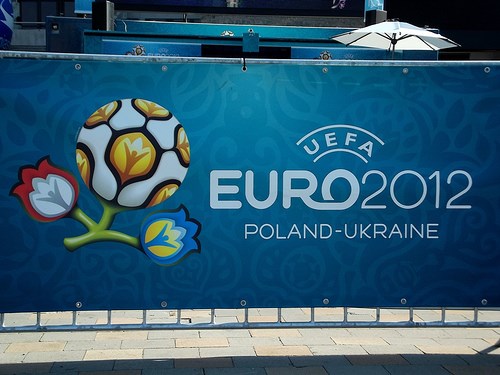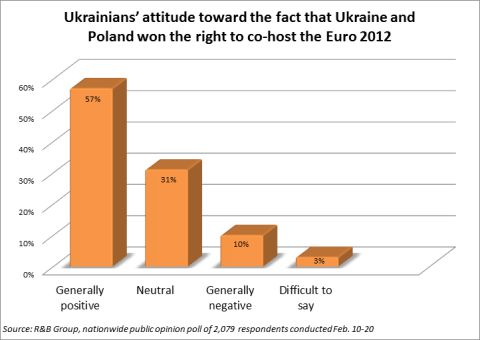Euro 2012: Ukraine’s PR disaster

Ukraine's venues for the Euro 2012 are ready to be branded with the tournament's flower logo, however, the PR deriving from Ukraine's preparations has so far presented more scandals than success stories. Photo: DrabikPany/Flickr
25.05.2012
By Mark RachkevychEven though Ukraine’s preparations for the Euro 2012 have been marred by corruption cases, overspending, human rights abuse and other scandals, there’s no shortage of official assurances that the tournament will be a success.
Ukraine’s Infrastructure Minister Borys Kolesnikov declared on May 18 that Ukraine and Poland are 100 percent ready. UEFA on May 21 announced that the 1.4 million match tickets are almost gone with only 5,000 unsold. The tournament organizer has taken over management of the eight venue stadiums and has started branding them in the Euro 2012 flower logo.
Foreign journalists are already pounding the pavement in Kyiv and other host cities in search of scoops. But unlike tiny Euro 2008 co-hosts Switzerland and Austria, the logistics of staging the tournament is hard, especially in Ukraine. Indeed, the distance between host city Gdansk on the Baltic Sea coast and Donetsk in Ukraine’s industrial heartland in the east is 1,810 kilometers.
This and because of the countries’ lack of experience, has prompted UEFA to invest 500 million euros in both countries, more than half its operational budget for the previous championship.
For starters, Ukraine only started on May 21 to sell tickets for the six high-speed Hyundai-made trains that will connect Kyiv with the other host cities of Kharkiv (480 kilometers), Donetsk (700 kilometers) and Lviv (540 kilometers). This is belated news to Western travelers who are accustomed to planning ahead.
Even if purchased online, train tickets still must be picked up at the train station or at an authorized dealer like a travel agency. Of the 33,000 state employees who took a three-month crash course in English, National Police Academy teachers said they were disappointed to learn that the 15,000 police officers who enrolled, scored the worst in comparison to medical personnel, emergency and customs officers, border and security guards.
So the interior ministry spent $693,000 to purchase 1,500 Ectaco iTRAVL devices that translate words and phrases into seven languages, including English, German and Spanish.
European coming out party largely off target
These and other problems are aggravating what is supposed to be Ukraine’s European coming out gala.
Originally in 2007 the event symbolized the common heritage between the two co-host countries and cooperation across the EU border, along with a prospective future for an ever-expanding European continent.
According to political science professor Olexiy Haran of the Kyiv Mohyla Academy, the preparations also were supposed to unite the country under “a common goal and solidify a national idea” for a country that is divided along linguistic lines of Russian and Ukrainian, and orientation toward European integration and stronger Russian cooperation.
Today the Euro 2012 is highlighting everything that is wrong with Ukraine. As Professor Andrew Wilson of Ukrainian Studies at the School of Slavonic and East European Studies at University College London pointed out, “Visiting journalists are queuing up to write the same story of ‘Poland good, Ukraine bad’”.
Stories abound that point to Ukraine having the highest HIV/AIDS prevalence rate in Europe, Kyiv’s inhumane treatment of homeless dogs, about sex tourism and unprotected sex, among other stories originating in Ukraine.
“From a PR perspective, the Euro threatens to be another major missed opportunity for this country,” said Dirck Smits van Oyen, who was the general manager of the successful Ukraine-Poland Euro 2012 bid.
He added: “Instead of discovering the potential and beauty of Ukraine, visitors and the public abroad are now daily reminded of the ugliness that exists in politics and business.”
European political leaders and royalty are skipping the Euro
And if things couldn’t get any worse, national leaders of some of the participating teams, including German Chancellor Angela Merkel have seriously talked of boycotting the event over the continued imprisonment of former Prime Minister Yulia Tymoshenko and other opposition leaders who they say are victims of show trials and selective justice.
The Ukrainian government has balked at these potential measures, saying that sports shouldn’t be politicized.
Still, Professor Haran added, Ukraine remains one of the most popular and open post-Soviet nations that has the confidence of UEFA to technically pull off the tournament.
A European diplomat based in Kyiv who asked to remain anonymous said, “the reason of their absence (boycott by European leaders) at the Euro 2012 was created by the Ukrainian authorities themselves. They don’t want to be abused for propaganda purposes…and their actions are not directed against common Ukrainian citizens, who should be aware of the initial reason of such an absence.”
Public opinion has kinder and less harsh attitude
The public has embraced the football tournament with a kinder attitude but not by much. Findings from a February representative nationwide poll conducted by market researcher R&B Group show that 57 percent of Ukrainians have a positive attitude toward Ukraine and Poland co-hosting the championship.
Sixty percent predicted that Ukraine will adequately host the tournament in comparison to 26 percent who said it won’t. Not surprisingly, 44 percent said Ukraine is ready to co-host the event.
And 56 percent of respondents said they have a favorable attitude toward the many foreign fans who will visit Ukraine while 27 percent harbored a negative attitude.
In the end a tale of two halves emerge as seen by Dutchman Smits van Oyen: “I think Ukrainians know how to throw a party and the tournament will be a great celebration. The only regret I have and something will stain this event is that teams like Holland will be playing in a city where the most important leader of the opposition imprisoned, the greed of Ukraine’s politicians is the biggest downside of this country.
Read also the first article by Mark Rachkevyich on Ukraine's Euro 2012 overspending
Mark Rachkevych is a Ukraine-based journalist working for the English-language newspaper, the Kyiv Post.






